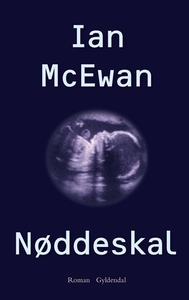You need to sign in or sign up before continuing.
Take a photo of a barcode or cover
dark
mysterious
fast-paced
Plot or Character Driven:
A mix
Strong character development:
No
Loveable characters:
No
Diverse cast of characters:
Yes
Flaws of characters a main focus:
Complicated
challenging
lighthearted
mysterious
reflective
sad
Plot or Character Driven:
Character
Strong character development:
Complicated
Loveable characters:
No
Diverse cast of characters:
Complicated
Flaws of characters a main focus:
Yes
DNF @ p.53
I'm torn on this one! I love McEwan's beautiful writing but I just can't get past how little this concept is working for me.
First of all, let me be clear: I love the original Hamlet. Both the character and the play as a whole. Shakespeare brilliantly combines righteousness, revenge, angst, and comic timing to produce a thoroughly fun and affecting work of literature. In McEwan's retelling, there's a disconnect. There are certain things I think McEwan does really well, like showing the narrator's conflicted feelings of love and resentment toward his mother. He writes Claude as the perfect punchable villain.
And yet the narrator (I'm just gonna go ahead and call him Hamlet 2) lacks the biting wit of the classic Shakespearean hero. Oh, he's clever. In fact, he's brilliant to the point of being obnoxious. And although Hamlet 1 has that same quality of self-congratulatory intelligence, he's also able to make fun of his situation even as it tears him apart mentally (or perhaps because he's coming apart at the seams and has nothing to lose). Maybe Hamlet 2 is just too sane. Something's missing.
The main problem I have with Nutshell, though, is not the dissatisfactory portrayal of one of my favorite characters. The flaw that I cannot forgive is McEwan's choice to implement the unique and original narrative device of a fetal protagonist only to then use that protagonist as a personal mouthpiece. The impression I got from Hamlet 2's frequent soliloquies is that McEwan wanted an excuse to talk about his views on current events and his taste in wine, but still wanted the product to be in fictional form. None of Hamlet 2's musings reveal much about his character--unless that character is a thinly veiled, supernaturally overdeveloped fetal version of the author. I just don't understand why McEwan would establish such a potentially interesting frame through which to tell this story if he wasn't going to treat Hamlet 2 as an actual baby. Why bother?
In short, I found the first fifty pages of this novel pretty insufferable and disappointing despite my love of the source material and McEwan's writing.
I'm torn on this one! I love McEwan's beautiful writing but I just can't get past how little this concept is working for me.
First of all, let me be clear: I love the original Hamlet. Both the character and the play as a whole. Shakespeare brilliantly combines righteousness, revenge, angst, and comic timing to produce a thoroughly fun and affecting work of literature. In McEwan's retelling, there's a disconnect. There are certain things I think McEwan does really well, like showing the narrator's conflicted feelings of love and resentment toward his mother. He writes Claude as the perfect punchable villain.
And yet the narrator (I'm just gonna go ahead and call him Hamlet 2) lacks the biting wit of the classic Shakespearean hero. Oh, he's clever. In fact, he's brilliant to the point of being obnoxious. And although Hamlet 1 has that same quality of self-congratulatory intelligence, he's also able to make fun of his situation even as it tears him apart mentally (or perhaps because he's coming apart at the seams and has nothing to lose). Maybe Hamlet 2 is just too sane. Something's missing.
The main problem I have with Nutshell, though, is not the dissatisfactory portrayal of one of my favorite characters. The flaw that I cannot forgive is McEwan's choice to implement the unique and original narrative device of a fetal protagonist only to then use that protagonist as a personal mouthpiece. The impression I got from Hamlet 2's frequent soliloquies is that McEwan wanted an excuse to talk about his views on current events and his taste in wine, but still wanted the product to be in fictional form. None of Hamlet 2's musings reveal much about his character--unless that character is a thinly veiled, supernaturally overdeveloped fetal version of the author. I just don't understand why McEwan would establish such a potentially interesting frame through which to tell this story if he wasn't going to treat Hamlet 2 as an actual baby. Why bother?
In short, I found the first fifty pages of this novel pretty insufferable and disappointing despite my love of the source material and McEwan's writing.
Truly something I've never read before. Original perspective. Although you could partially read this in the voice of Stewey from Family Guy. Bit of humor but also deeply philosophical while still moving the plot along. Easy, short read. I'm glad it wasn't too long.
dark
emotional
funny
lighthearted
tense
medium-paced
Plot or Character Driven:
A mix
Strong character development:
Yes
Loveable characters:
No
Diverse cast of characters:
Complicated
Flaws of characters a main focus:
Yes
An experimental novel? Hamlet is a fetus...a very smart fetus. I really loved this book!
Ian McEwan is definitely among my top favorite writers of all time. He first enchanted me with Atonement, then went on to shock me with The Cement Garden, and finally completely entranced me with the morbidity of The Comfort of Strangers. He is the master of writing blunt, entangled, and dark relationships that you cannot help, but be tempted to spy on through the author's keyhole. I really should read McEwan more often.
The most interesting angle for me in this book is its narrator - the nine-month-old fetus, - whose observations and commentary go well beyond his years or experience. He enjoys the wines his mother Trudy occasionally drinks, dreams of good books accompanied by Bach, and despises Claude - his mother's new lover. This not-yet-born child weighs in on infidelity and his father's submissive nature, discusses how much of Claude or John resides in his own psyche, and tries to convince himself of Trudy's love, despite the ever-increasing evidence to the contrary.
More on Chaika Books
The most interesting angle for me in this book is its narrator - the nine-month-old fetus, - whose observations and commentary go well beyond his years or experience. He enjoys the wines his mother Trudy occasionally drinks, dreams of good books accompanied by Bach, and despises Claude - his mother's new lover. This not-yet-born child weighs in on infidelity and his father's submissive nature, discusses how much of Claude or John resides in his own psyche, and tries to convince himself of Trudy's love, despite the ever-increasing evidence to the contrary.
More on Chaika Books
I really wanted to like this more. Such an interesting idea and some parts really sucked me in but then I'd get lost in the writing and have to Re-read parts or skim past others. Every once and awhile I felt the writing style would change and he'd lose me.
challenging
emotional
slow-paced
Plot or Character Driven:
Character
Strong character development:
Yes
Loveable characters:
No
Diverse cast of characters:
No
Flaws of characters a main focus:
No






